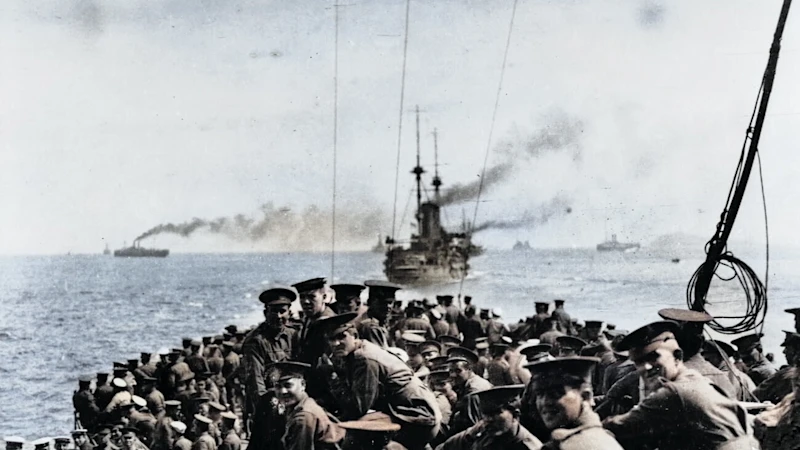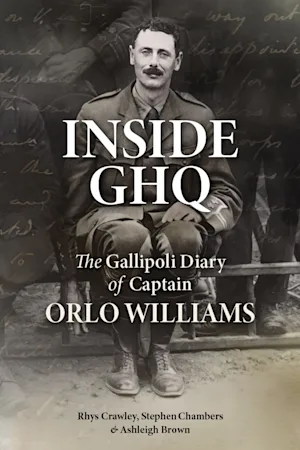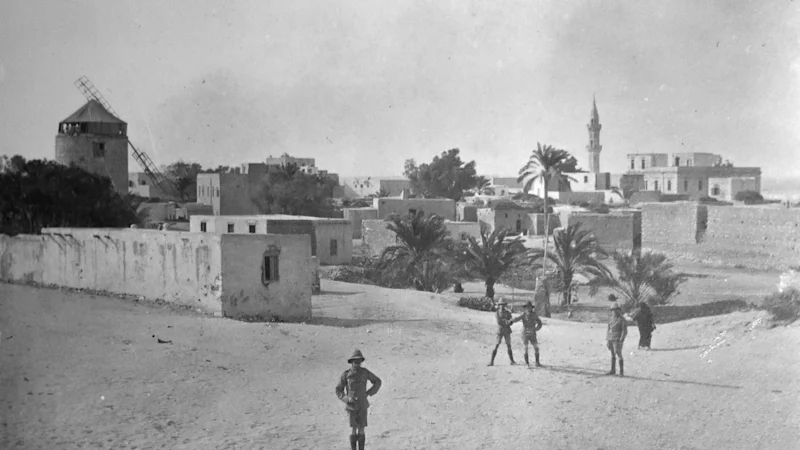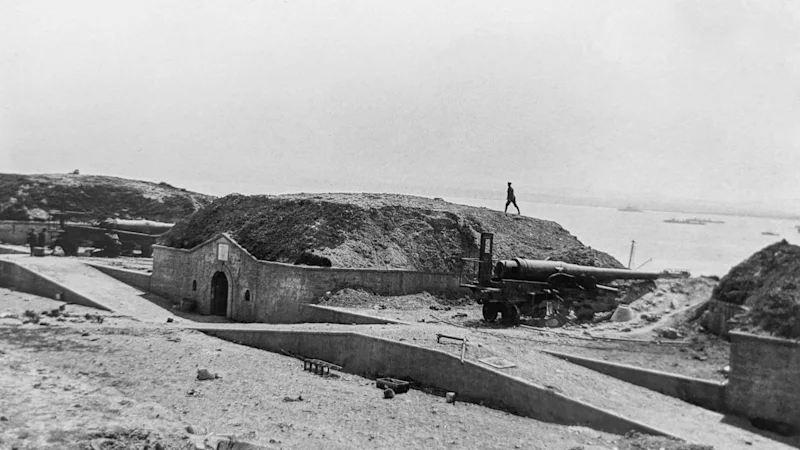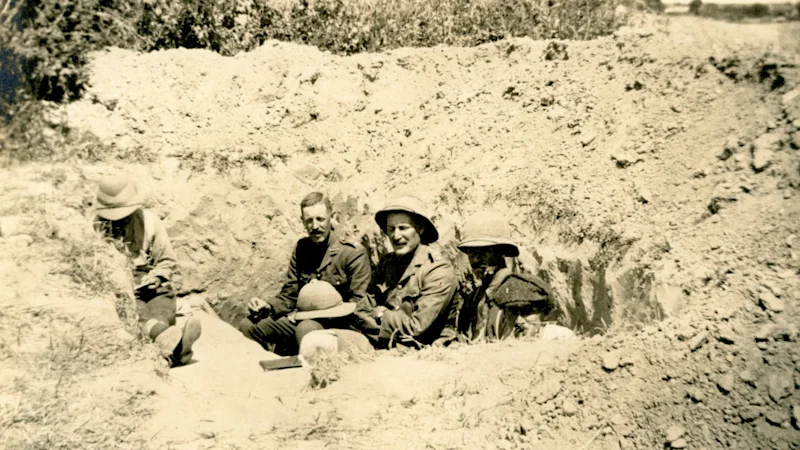Twenty-five years after Gallipoli, Captain Charles Arthur Bolton—known affectionately as ‘Bessie’ to his fellow officers—penned this retrospective for the Royal United Service Institution Journal. Bolton served as GSO3 in the Operations Section at GHQ Mediterranean Expeditionary Force.
Readers of Orlo Williams’ diary, Inside GHQ, will recognise Bolton from Orlo’s vivid portraits: ‘stout and burly,’ ‘a very good fellow’ who had studied at Oxford, a chess companion during quiet moments, and later, somewhat poignantly, as ‘old heavy-eyed Bolton’ who felt increasingly sidelined as the campaign progressed. Orlo even composed a humorous verse about him:
Bolton sits about the room
In an attitude of gloom...
Bolton’s account complements Orlo’s observations of the hastily assembled staff and their frantic preparations for the landings of 25 April 1915. What follows is Bolton’s article as it appeared in the RUSI Journal of May 1940 (Vol. LXXXV, No. 538).
TWENTY-FIVE YEARS AGO
THE GREAT AMPHIBIOUS ADVENTURE
By C. A. B.
Midnight, 11th March, 1915. A despatch rider from Battalion H.Q. with a telegram, ‘‘Report at once to H.Q., 29th Division, Leamington.” On arrival, new orders to report at War Office forthwith; twenty-four hours to say good-byes and prepare, and then, at 3.30 p.m. on Friday, 13th March, a special train at Charing Cross awaiting a small assembly of General and Staff officers. At 4 p.m. we are all aboard; General Sir Ian Hamilton and the nucleus of his General Staff leave for the Gallipoli adventure, with the First Lord of the Admiralty and a few friends and relations to wave them ‘‘Godspeed.”
There were twelve of us on the train, the Commander-in-Chief and his A.D.C., St. John Brodrick; his M.S., and brother-in-law, S. Pollen; Major-General Braithwaite and his son as A.D.C.; Williams (G.I.), Fuller, Grant, and Aspinall (G.2s), Dawnay and myself (G.3), and [Orlo] Williams, librarian to the House of Commons, as Cipher officer.
At 7 p.m., having embarked in H.M.S. “Foresight,” we left Dover for Calais. There was a thick fog, and as we steamed towards France we lost direction; presently the sound of heavy guns was heard and, as we learnt later, we were off Nieuport and the left of the line in Flanders. Having altered course, we eventually reached Calais about 9.30 p.m. Here the C.-in-C’s second A.D.C., John Churchill, joined us, and thirteen in number we left at 10.30 p.m. for Paris, en route for Marseilles, by special train.
Paris, 7.30 a.m., 14th March; and half an hour later on to Marseilles. There we arrived at 6 p.m. and embarked in the fast light cruiser H.M.S. “Phaeton.” We slept in harbour that night and early the following morning steamed for Toulon to fuel with oil. A hasty dash ashore to post letters and look round, and then, at 1 p.m., we started on our final stage. The Mediterranean was very kind, blue as only it can be and calm as the proverbial millpond. The “Phaeton” maintained a steady 28 knots, vibrating greatly but otherwise serene. Through the Straits of Messina and the Grecian Isles we steamed as if on a yachting cruise and then, precisely at 2 p.m., on 17th March, as we dropped anchor at Tenedos, H.M.S. “Dartmouth” arrived with Admirals de Robeck and Wemyss and General d’Amade aboard. We were at our journey’s end, four days less two hours since our train steamed out of Charing Cross.
That night we stayed at Tenedos, while the Admiral Commanding, the Commander-in-Chief and the French Commander conferred and we heard of the attempt to be made next day by the combined British and French fleets to silence the Turkish forts and force the Straits. The morning of the 18th found the “Dartmouth” gone and still in the “Phaeton” we set out to reconnoitre the Peninsular. During the outward voyage we had, under the direction of the C.G.S., studied such maps as were available and we were anxious to compare our deductions with the ground itself. We therefore steamed slowly along the coast about a mile off shore from Cape Helles, almost as far as Bulair, and in the Gulf of Xeros we came upon the five-funnelled Russian cruiser ‘‘Askold”—the ‘‘packet of fags” as the Navy called her—keeping a lonely watch. With our glasses and telescopes we studied the land and more especially the areas which from the map we had selected as possible landing places. At every such spot the Turks were observed to be digging hard, so that we knew for certain, what we had only surmised before, that the previous naval activities had put the enemy wise to our intentions.
Back we turned, therefore, as if for Tenedos and then, as we passed Cape Helles, we altered course, increased speed and, passing the battered forts at Seddul Bahr, entered the Straits. As we steamed in, a most inspiring sight unrolled itself before our eyes. In a great semi-circle, facing and bombarding the forts at the Narrows and Kilid Bahr, were the battleships and cruisers, apparently stationary, and around them a swarm of smaller craft. Presently, when one had had time to sort out one’s first impressions, we began to notice splashes on the water about our ship and to realise that the Turkish field batteries on the Asiatic coast were paying us some slight attention. Then, as we steamed still further in, we suddenly became conscious of a large ship slowly—very slowly—moving towards us on our starboard bow, very low in the water and with a slight list forward. All her crew, except presumably the stokers in the engine-room, were on deck and it looked as if at any moment she might sink before our eyes. This, we discovered, was the “Inflexible” which had struck one of the Turkish mines, which a little later sunk her sister battleships, “Ocean” and “Irresistible” and the French battleship “Bouvet.” She was being escorted by destroyers and we turned and followed her, ready to give what help we could, in case she sank. Then, having seen her as far as Rabbit Island, where she was beached, we steamed for Tenedos.
Next day we proceeded to Mudros and, as the “Phaeton” was ordered home, we transferred to the S.S. “Franconia” and established our G.H.Q. aboard. Five days we waited there and various officers of the Intelligence branch, including Doughty Wylie and Deedes, joined us and then, on the 24th, we were off again, this time for Egypt.
On the 26th we reached Port Said, and left the following day at 12.45 p.m. for Alexandria, where we arrived that evening. As far as Ismailia the railway followed the line of the Canal defences and we were thus able to see for ourselves the sites of the chief points of the Turkish attacks, which had taken place some six weeks previously; and at two places the actual pontoons, which the Turks had used.
At Alexandria we were quartered in the Savoy Palace Hotel with our offices in a building about half a mile away in a street off the Mohamed Ali Square. Rumour had it that the house was previously a well-known “maison tolerée” and that many enquiries were made of our clerical staff after dark from former clients of the departed ladies. During the daytime, however, we were not disturbed and from 28th March till 7th April we were busy, with Captain F. Mitchell, R.N., to help us, working out details of the contents of ships, ships’ cutters, steam pinnaces, picket boats, lighters, etc., for the landing of troops, guns, ammunition, animals and stores upon an open beach. This work so inspired one of our number [Orlo] that he wrote the following lines, a copy of which I have before me now:—
The P.N.T.O. and the P.M.L.O.
Round Tekke Burnu slowly steamed
A British Man-of-War,
The guns were slowly booming from
The forts of Sedd-el-Bahr,
With no light but the fitful gleam
Of searchlights from afar.
The P.N.T.O. and the P.M.L.O.
Were gazing at the strand;
“Do you suppose,” the P.N.T.O. said
“That we shall ever land?”
The P.M.L.O. said nothing, but
He coughed behind his hand.
“If seven tugs with seven tows
Started at dead of night,”
The P.M.L.O. said, “I wonder if
They’d land enough to fight.”
The P.N.T.O. thought abstractedly
And simply said, “They might.”
“And will they,” asked the P.M.L.O.,
“Land on the proper beach,
This one on ‘X’, that one on ‘Z’,
And so on each to each?”
The P.N.T.O. held his finger up
Like one about to preach.
“We’ve thrashed it out, with wrinkled brows
And tears,” the P.N.T.O. said,
“And none will land on ‘W’
That ought to land on ‘Z’.”
The P.M.L.O. politely smiled
The smile of the well-bred.
“At break of dawn” the P.N.T.O. said,
“Our ships will open fire,
The gallant troops will then advance
As far as they desire.”
The P.M.L.O. was indistinct;
I think he muttered “Wire.”
“And what is wire," the P.N.T.O. cried,
“Against a naval shell?
One of us goes there every day
And shoots away like hell.”
“And do you," said the P.M.L.O.
“Not leave your card as well?”
But when the fateful morning came,
Whose, how, and why and when,
Are matters little suited for
A merely ribald pen.
The P.N.T.O. and P.M.L.O.
Both quitted them like men.In after years, the text book said
To budding G.S.O’s,
“This is the Golden Rule for both
P.N.T.O.’s and P.M.L.O.’s:
Its no good counting up your hands,
Before you count your tows.”[Notes] Pronounce P.N.T.O. as Pinto and P.M.L.O. as Pumelo.
PN.T.O. Principal Naval Transport Officer.
P.M.L.O. Principal Military Landing Officer.
Meanwhile transports had been arriving daily, but not as yet with any of the Administrative Staff of G.H.Q., so that the General Staff were doing administrative work, and rightly or wrongly, committing our “A” and “Q” to plans, with which they might, on arrival, disagree. This was most unsatisfactory but in the circumstances unavoidable.
On 8th April we left Alexandria and by the 10th we were back again at Mudros, this time in the S.S. “Arcadian.” And here it is as well and perhaps time to explode a myth, which is still prevalent and almost handed down to history, namely the story that the “Aragon” was the luxury ship of G.H.Q. G.H.Q. were never in the “Aragon,” luxury ship though she may have been. The “Aragon” was the Headquarters ship of the Governor of Mudros, Rear-Admiral Roslyn Wemyss, and remained at Mudros until the end of the campaign. The “Arcadian,” no luxury ship, as those who lived aboard can certify, after being off the Peninsular until the second week in May, took G.H.Q. to Imbros, where they disembarked and formed a camp ashore.
(It has always been my desire to destroy this myth, so I hope the above digression may be excused.)
At some date during the next fortnight the Administrative Staff arrived and had to pick up the threads as best they could in the short time available and make all necessary measures to fit in with the plans in which we had perforce involved them. For us of the General Staff, the time was passed in putting the finishing touches to orders, transmitting messages to the War Office and visiting Divisional and other Headquarters on neighbouring transports, which were arriving daily in the harbour.
On or about 18th April, the date for the landing, weather permitting, was fixed for St. George’s Day, 23rd April. On the 21st and 22nd it was blowing a gale, so that there was no hope of effecting a landing next day, and the operation was postponed until the 25th. In the meantime it had been decided that certain officers of the General Staff were to land with the covering force, and Williams (G.1) and Doughty Wylie were ordered to go ashore from the “River Clyde” on “V” Beach, while I was detailed for “W” Beach.
The wind subsided by the 23rd, so that afternoon about 2.30 p.m. I left the “Arcadian” and embarked on another transport, the name of which I have forgotten. The beastliness of modern war has done its best or worst to cloud the pageantry of ancient times, but this departure from Mudros harbour for the great adventure was one of those occasions when one could be excused a feeling of exhilaration and pride and, even after all these years, the memory still remains. As the Official Historian has said, “As each transport passed through the waiting fleet, cheer upon cheer broke from her crowded decks and the watching bluejackets cheered and cheered again.” We were off and the great day had come at last.
The following day we spent at Tenedos, and that evening, just before dusk, we of the G.H.Q. landing party for “W” Beach transhipped from our transport to H.M.S. “Implacable.” With us aboard were Brigadier-General Hare and his Brigade Major, Frankland, the 2nd Bn. Royal Fusiliers, and H.Q., and half “D” Company, 1st Bn. Lancashire Fusiliers. I happened to be near the ladder as some of the troops were climbing aboard and one of the young soldiers slipped and dropped his rifle in the sea. His Company Sergeant-Major’s comment came at once, “Don’t you worry, my lad, there’ll be lots of dead or wounded men to-morrow from whom you can get a rifle.” True, no doubt, but not a well chosen word of encouragement!
We dined with the Captain in his cabin that night and later turned in for such sleep as we could snatch before an early rise next morning. The Chaplain very kindly gave his cabin up to me.
At 5 a.m. we were up on deck and half an hour later the bombardment of the beaches started. In the half-light that precedes the dawn, at 6 a.m., the tows of boats could be seen leaving their ships for the shore, and shortly afterwards the sun rose in a red ball from behind Achi Baba, shining full in our eyes. At 7 a.m. we got into our picket boat and making for the northern end of “W” Beach, we successfully landed about a quarter of an hour later under the shelter of the cliff. I immediately made my way to the beach and the sight that met my eyes was one that made me wonder how the troops had ever got ashore. A belt of wire, at least 9 feet in depth, stretched from cliff to cliff except for a gap about the centre of the beach, some 10 to 15 yards wide. Along the beach were some 60 to 70 dead or severely wounded Fusiliers, and in the northern corner was the Medical Officer doing his best to succour all he could. The water’s edge was red with blood as it lapped against the shore. There was no time to brood on such matters and we set about selecting sites for Headquarters and for the various forming-up places, supply depots, water stations, etc., that were to be established later on the beach or in its vicinity.
In the meantime sappers of the 1/2nd London Field Coy., R.E., were busy clearing the beach itself of dead and wounded and of wire entanglements. A little later I discovered that there was no Brigade Staff on the beach and heard that the Brigadier had been badly wounded and the Brigade Major killed. Farmar, the Staff Captain, was with the firing line. Kane, the Brigade Machine-Gun Officer, was on the beach. Although I belonged to G.H.Q., and not to the 29th Division, and had not seen Divisional orders, I found myself the only executive Staff officer present. For two hours no further boats approached the shore, until about 9.45 a.m. the 1st Bn. Essex Regt. landed and I met them and explained the situation to the C.O. As he was moving off, I turned away and to my intense astonishment saw a most unexpected sight—a complete civilian, dressed in a blue lounge suit with a straw hat on his head and carrying a Gladstone bag. In answer to my amazed enquiry, he told me he was the interpreter attached to the 1st Essex. As the firing line was only a comparatively short distance beyond the crest overlooking the beach, I took on myself the responsibility of ordering him to stay on the beach. What was his fate I never knew, for I did not see him again.
Wolley Dod, G.S.O.1, 29th Division, arrived ashore at 12.30 p.m., and I was then able to carry on with the duties for which I had been sent ashore.
The day wore slowly on; a few minor incidents come back to me; smoking a cigarette and chatting with Kane, when a very spent bullet hit him in the left temple, penetrating so slightly that I was able to extract it as if it had been a tooth; having some trouble with a Chaplain over the burial of the dead; but our chief worries were the lack of progress in our advance ashore. We knew that the landing at “V” Beach was held up, and that no appreciable advance had been made by the troops from our own beach. We felt the lack of artillery and no guns were landed until late in the afternoon. The working parties on our beach had been, perforce, used to reinforce the firing line and, although the beach was clear, other essential work was held up.
About 9 p.m. those of us, who could, lay down to try and snatch some sleep, but immediately afterwards firing broke out all along the line above the beach and continued more or less regularly throughout the night. Sleep being impossible, we stood about and talked and smoked amid a steady stream of “overs” whipping into the sea behind. The rest is history.
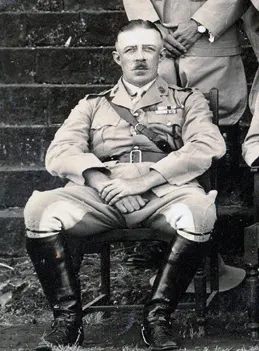
C.A.B.
Charles Arthur Bolton CBE (1882–1963), educated at Marlborough College and New College, Oxford, was a British Army officer whose career spanned both World Wars. Commissioned into the Manchester Regiment in 1902, Bolton attended Staff College in 1912. He played rugby for United Services and was called up by England as a reserve for their match against the 1908–09 Wallabies, before gaining his sole cap in a win over France at Leicester in 1910, playing as a wing-forward.
During WWI, Bolton served at Gallipoli as GSO3 on Sir Ian Hamilton’s GHQ staff, acting as the GHQ representative at the Lancashire Fusiliers’ landing on W Beach on 25 April 1915. Around mid-1915, he became Brigade Major of the 88th Infantry Brigade, 29th Division. He was with that Brigade on 6 August at Helles and later that month at Suvla, but in September fell victim to dysentery and was evacuated to a hospital ship and thence home to England. Despite multiple mentions in despatches and significant staff work throughout the war, Bolton felt overlooked for decorations, though he eventually received a CBE in 1919.
After transferring to the Tank Corps, Bolton commanded the 5th Battalion Royal Tank Corps (RTC) from 1927 to 1931. The battalion was one of the units in the Experimental Mechanized Force. He then commanded the RTC Centre at Bovington from 1931 to 1935. Recalled from retirement in 1940 as a Brigadier, he built the Middle East Pioneer and Labour Directorate from nothing to an organization of 110,000 civilians and 67,000 soldiers across 190 companies.
Bolton retired to South Africa in 1942 and died in Eastbourne in 1963.
Inside GHQ
Captain Bolton’s retrospective complements the more detailed portrait found in Orlo’s diary, recently brought to publication by Little Gully.
Inside GHQ: The Gallipoli Diary of Captain Orlo Williams offers an unparalleled window into the daily experiences and frustrations of the staff officers who planned one of the most ambitious—and ultimately tragic—operations of the First World War.
Orlo captures not just the camaraderie that sustained these men, but also the professional jealousies and political maneuvering that shaped the campaign’s execution.
